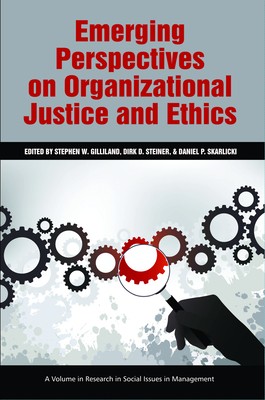
- We will send in 10–14 business days.
- Publisher: Information Age Publishing
- Year: 2011
- Pages: 296
- ISBN-10: 1617355828
- ISBN-13: 9781617355820
- Format: 15.6 x 23.4 x 1.8 cm, hardcover
- Language: English
- SAVE -10% with code: EXTRA
Emerging Perspectives on Organizational Justice and Ethics (Hc) (e-book) (used book) | bookbook.eu
Reviews
Description
A volume in Research in Social Issues in Management Series Editors: Stephen W. Gilliland, The University of Arizona, Dirk D. Steiner, Université de Nice-Sophia Antipolis and Daniel P. Skarlicki, The University of British Columbia This volume in Research in Social Issues in Management expands our understanding of organizational justice and applies justice theories to develop models of ethical behavior in organizations. At a time of global economic recession and frequent business and accounting scandals, many people are questioning the ethics of business leaders. Whether these challenges are actual or perceived, models grounded in organizational justice theories provide powerful insights and suggest new ways of looking at leadership ethics. By examining what it means to be just and examining relationships between justice and ethicality, the chapters in this volume have provided conceptual models for understanding ethical challenges facing organizations. The chapters are organized around two related themes. The first theme is expanding models of organizational justice. After 30 years of research, a natural question is whether we have reached the useful limits in developing theories of organizational justice. The clear answer you will see after reading these chapters is no, as each chapter pushes our thinking in new directions. The second theme is applying organizational justice theories to develop models of ethical and unethical behavior in organizations. The models address topics of greed, dehumanization, and moral contracts.
EXTRA 10 % discount with code: EXTRA
The promotion ends in 6d.13:52:34
The discount code is valid when purchasing from 10 €. Discounts do not stack.
- Publisher: Information Age Publishing
- Year: 2011
- Pages: 296
- ISBN-10: 1617355828
- ISBN-13: 9781617355820
- Format: 15.6 x 23.4 x 1.8 cm, hardcover
- Language: English English
A volume in Research in Social Issues in Management Series Editors: Stephen W. Gilliland, The University of Arizona, Dirk D. Steiner, Université de Nice-Sophia Antipolis and Daniel P. Skarlicki, The University of British Columbia This volume in Research in Social Issues in Management expands our understanding of organizational justice and applies justice theories to develop models of ethical behavior in organizations. At a time of global economic recession and frequent business and accounting scandals, many people are questioning the ethics of business leaders. Whether these challenges are actual or perceived, models grounded in organizational justice theories provide powerful insights and suggest new ways of looking at leadership ethics. By examining what it means to be just and examining relationships between justice and ethicality, the chapters in this volume have provided conceptual models for understanding ethical challenges facing organizations. The chapters are organized around two related themes. The first theme is expanding models of organizational justice. After 30 years of research, a natural question is whether we have reached the useful limits in developing theories of organizational justice. The clear answer you will see after reading these chapters is no, as each chapter pushes our thinking in new directions. The second theme is applying organizational justice theories to develop models of ethical and unethical behavior in organizations. The models address topics of greed, dehumanization, and moral contracts.


Reviews